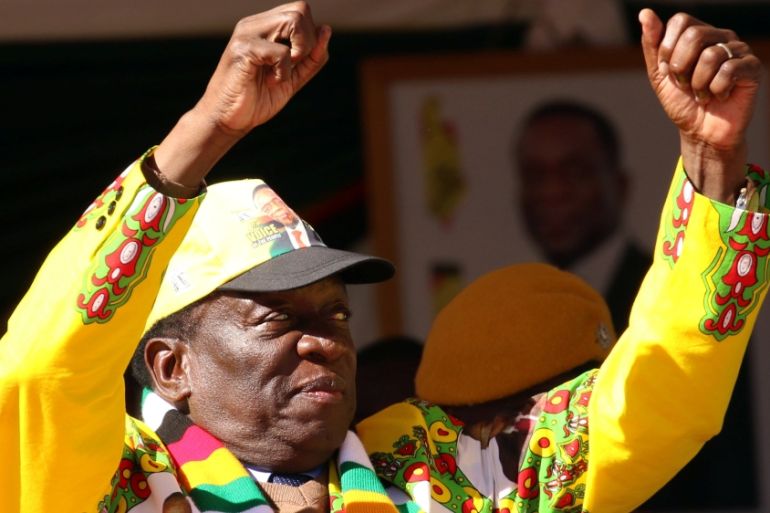Zimbabwe elections: Mnangagwa courts white voters before vote
President is on the campaign trail before what is expected to be a tight contest on July 30.

Zimbabwe’s President Emmerson Mnangagwa has told the country’s white farmers that the era of land seizures is over, calling on them to work together with the government in advance of elections on July 30.
Mnangagwa, who came to power after long-time President Robert Mugabe was deposed following a military intervention in November, is on the campaign trail before what is expected to be a close-run race.
Keep reading
list of 4 itemsWhy are nations racing to buy weapons?
Parallel economy: How Russia is defying the West’s boycott
US House approves aid package worth billions for Ukraine, Israel
His main challenger is 40-year-old Nelson Chamisa, the leader of the opposition Movement for Democratic Change (MDC).
The white Zimbabweans who are left in the country – estimated at around 30,000 – would usually vote MDC or for another opposition party, given the strained relationship with Mnangagwa’s ruling ZANU-PF.
But Mnangagwa, a 75-year-old former Mugabe ally, has pledged to end the violent seizure of white-owned commercial farms, a policy that Mugabe said was intended to redress post-colonial imbalances.
“This issue of new [land] invasions is a thing of the past. The rule of law must now apply,” Mnangagwa told a group of about 200 white Zimbabweans in Borrowdale, a wealthy suburb in the capital, Harare, on Saturday.
Mnangagwa said his government was “racially blind” and needed the expertise of everyone across the economy.
“I am saying we should cease to talk about who owns the farm in terms of colour. It is criminal talking about that. A farmer, black farmer, a white farmer is a Zimbabwean farmer.”
‘PR stunt’
Agricultural output crashed in the aftermath of Mugabe’s decision to impose the policy to expropriate farms in 2000. Many farms ended up in the hands of powerful politicians, soldiers or local chiefs and fell into disrepair.
“I know of some chiefs who have moved from one farm to another. Then they run it down. Then he leaves that farm and he is issued another one. He runs it down. That time is gone,” said Mnangagwa.
Mnangagwa is hoping to revive a once-promising economy, end chronic cash shortages and bring down soaring unemployment. In order to do this, he needs the help of Western donors who want to see the issue of white-owned land addressed.
“We need to come together now, interact with our councillors, our MPs – not alienate ourselves from politics,” Jason Deetlefse, a ZANU-PF supporter, told Al Jazeera at the rally.
Opponents, however, dismissed the event as a publicity stunt backed by people with political and financial interests, expressing scepticism about the time of the president’s reassurances a few days before the elections.
“I’m not surprised. You have to look at where this took place,” said David Coltart, an MDC senator.
“There are some very wealthy whites there who have long established connections with ZANU. It’ll be the community who have business connections.”
Just three percentage points separate Mnangagwa and Chamisa, according to an opinion poll by the Afrobarometer research group, which surveyed 2,400 voters across Zimbabwe between June 25 and July 6.
Heightened tensions
The elections, the first held in decades without Mugabe on the ballot, are being closely watched by the international community.
Kofi Annan, the former United Nations chief, is leading a team of observers known as the Elders.
“Parties have generally been able to campaign peacefully,” Annan told reporters. “Even though there have been complaints of intimidation, violence, but generally they have been able to get their work done.”
But the opposition has repeatedly expressed concerns, with Chamisa complaining that the electoral process is flawed. He has also alleged that the voters’ roll contains so-called ghost voters and that the ZANU-PF party is tampering with ballot papers.
“Election observers are urging politicians to resolve their differences through dialogue before voting day. Time is running out,” said Al Jazeera’s Haru Mutasa, reporting from Harare.
“Some opposition supporters say they will protest next week if their issues aren’t addressed – these accusations and counter-accusations have heightened tensions.”